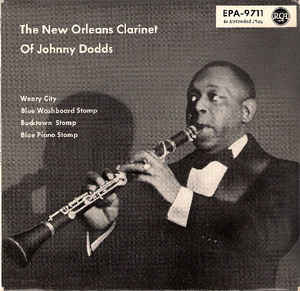The Red Hot Jazz Archive calls Johnny Dodds one of the greatest clarinetists of the 1920s. The site says that two other greats of the day — Sidney Bechet and Jimmie Noone — had better technique, but Dodds had a soulful and bluesy style that made up for any shortcomings.

Johnny Dodds
Dodds was a part of the early New Orleans jazz scene, which is the same as saying he was there when modern American music was born. He was along for the ride during the days that Louis Armstrong was revolutionizing the genre and played in many of the “hot” jazz bands of the day. He played with Kid Ory, Fate Marable, Jelly Roll Morton and King Oliver. Dodds was on Armstrong’s Hot Five and Hot Seven records, which are among the most important records ever made.
Wikipedia notes that Dodds played alto sax as well as clarinet. The site, as usual, provides a well done bio. Dodds — which the site says is pronounced “dots” — was born in 1892 in Waveland, Mississippi and moved to New Orleans as a youth. He later lived in Chicago. He didn’t record during the 1930s due to poor health and died in 1940. His brother, Warren (Baby) Dodds, was an influential drummer.
Jim Cullum at the Riverwalk Jazz Collection summarizes a piece written by Margaret Moos Pick that describes Johnny Dodds’ style more informally than the other bios. She quotes a critic who extolled Dodds’ full and round tone and called Dodds one of the most original and talented of clarinetists from the city, which of course overflowed with great musicians and creativity – as it does today.
Whenever early New Orleans jazz is discussed, the same names come up. Armstrong. Ory. King Oliver. Marable. Dodds. Their names fade a bit with time — all but Armstrong’s — but their influence remains strong and should not be forgotten. They all are part of of the DNA of American music.
Above is “Melancholy” and below is “After You’ve Gone.” The Daily Music Break has posted on Louis Armstrong on many occasions, including here, here and here. The site also has posted on Jelly Roll Morton and Sidney Bechet.

